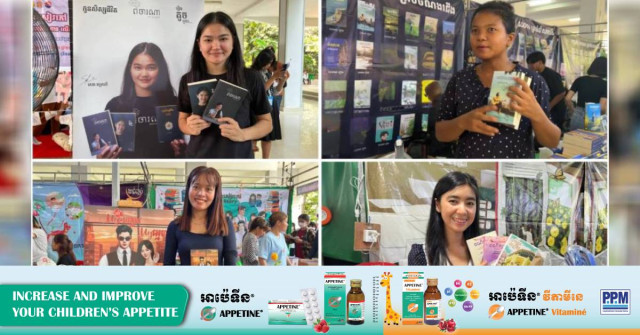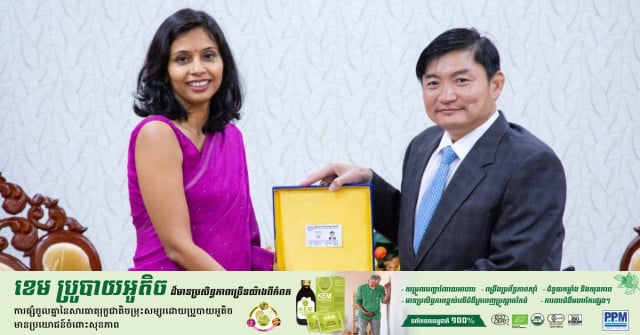National Reading Day: Writers Thrilled to See More Young Readers

- By Heng Sreylin
- and Tob Vannara
- March 11, 2024 9:50 AM
PHNOM PENH — Around 100 booths were set up at the Institute of Technology in Phnom Penh to celebrate the annual National Reading Day with authors saying how thrilled they are to see more and more young people reading books.
The three-day event kicked off on March 9, marking the 9th edition of reading day. Organized by the Ministry of Education, Youth and Sport, the Ministry of Culture and Fine Arts, and the Ministry of Information, it has been held on the theme “Reading is the foundation for all in life.”
The event has showcased a variety of books on numerous topics. Visitors have included many young people and students who have browsed through books, with several of them purchasing copies in some cases to support their favorite authors.
A few authors interviewed at the event said how glad they were to see the public support their work and many young people enjoy reading. Seeing this gives them the courage and even energy to keep on writing, some writers said.
“I am happy when they come, even if they don’t buy books,” said book author Set Hatta. “When I see them participate in events related to reading and books, I feel happy because I see that our people and young people are interested in reading.”
Hatta, who has taken part in the book fair on National Reading Day since 2017, said that the number of participants has gone up every year except during the COVID-19 pandemic when the event did not take place.
“We might have thought that not many people would come after [the pandemic],” she said. “But this year, it turned out that many more people are coming than before because of extensive promotion by the organizers, the relevant ministries, and publishers. Therefore, [the announcement] of this book fair reached a lot of readers.”
According to the book author, there are three main benefits of this book fair. First, people with limited resources can browse through books and may decide to save money to buy a specific one later on, Hatta said. “A family might prepare a budget for reading,” she said. “[B]ecause reading can change a person, and when they can change themselves, they may change their family, community, and society for to better in the future.”
The second benefit of the event is that some readers can meet authors, and also buy some books with discounts or through promotions. And the third one is that readers can easily find books they want to read and which are difficult to find in bookstores, Hatta said.
Seng Gechly, a book author with five years of experience, said that she is happy to see not only more young readers but also writers. “I am happy that every time we have National Reading Day and book fair, readers have the chance to meet authors and see other book booths beside mine,” she said.
Gechly said that she would also like to see book events take place in the provinces. She added that she would like to tell young people to read more as reading helps acquire knowledge and may help them grow, be open-minded, and even battle depression or face their problems if they are in such situations.
Book author Mao Chanraskmey said she had been glad to meet readers and to see that high school as well as university students had come to the book fair. “I am very happy not only because of the books sold but also when I see many young people reading,” she said. “It is a good opportunity to meet my fans and other authors too.”
Having more people read was also important for author Kim Dy Na, “The increasing number of readers not only increases book's sales: As a book author, reader and Cambodian, I am happy because reading is important,” she said.
Dy Na said that she wants to promote reading among children. Fortunately, she said, reading receives support from relevant government institutions and non-government organizations that have worked hard to promote reading and remind parents of the value of reading and encouraging their children to read.
If parents want their children to have reading habits, they should encourage them early to do so because reading may contribute to making children become good young people in the future, Dy Na said.
The four authors said how glad they were, not only of people having bought books at the event, but also of seeing students and young readers showing a keen interest in reading. They all hoped to see more Cambodians develop a habit of reading.
Originally written in Khmer for ThmeyThmey, this story was translated by Chhuon Kongieng for Cambodianess















